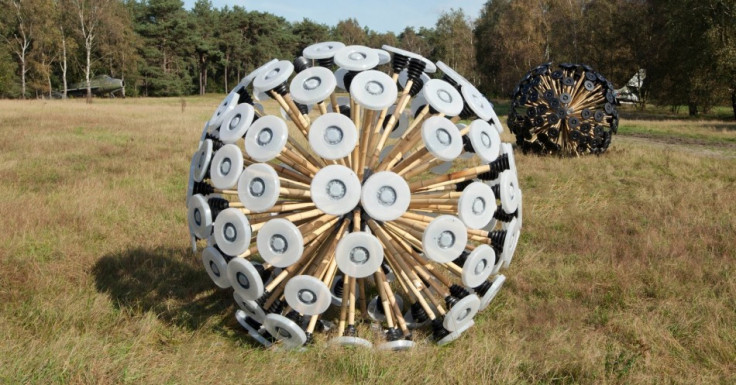Afghans Develop Wind-Powered Mine Detector [VIDEO]
Device made of bamboo and plastic costs less than £25
Two Afghani brothers have created a device that can be used to detonate landmines and costs less than £25 to produce.

Called Mine Kafon in the Davi language - which translates to Mine Detector in English - the device is made of bamboo sticks and biodegradable plastic, and is carried by the wind in order to roll over minefields.
Massoud Hassani, an industrial engineer and one of the creators of Mine Kafon, described the device to Reuters:
"Every foot has a circular form of a frisbee," explained Hasani "so it's kind of catching the wind from inside. There are about 170 feet with aerodynamic shapes to catch the wind, so that's why it's very easy moving and at the same time it's light enough to move around and also heavy enough to detonate landmines."
Weighing only 70kg, the Mine Kafon can survive four landmine explosions before losing too many legs to function properly. Apparently inspired by toys that Massoud and his brother Mahmud used to build as children, the Kafon also has a GPS chip in its centre that can track its movement through minefields and be used to retrieve it:
"Every Mine Kafon has a GPS chip inside it," continues Massoud Hassani "because it's moving wind-powered, you don't know where it is going and where it was, so now it is mapping the route where it was and where it's going, so that GPS chip inside the ball is adding all the information to the website or to the application on your phone."
Unlike the bamboo legs, the core of the Kafon is not destroyed by explosions and stores important information on the device's movement, similar to an aeroplane's black box.
In 2011, the Dutch military tested the device in the Moroccan desert but found it unsuitable for use in its current form; the Hassani brothers are now hoping to raise $100,000 (£62,000) from international backers to help improve the Kafon's design.
It is estimated that 110 million landmines are currently planted in the ground across the world, with 250 million more stockpiled in over 100 countries.
© Copyright IBTimes 2024. All rights reserved.






